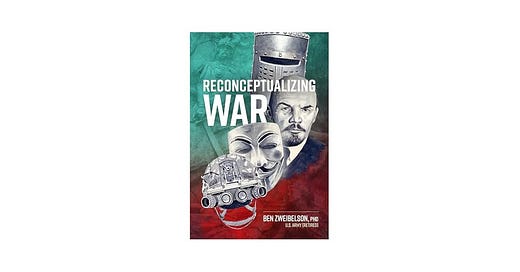My review of *Reconceptualizing War* by Dr. Ben Zweibelson
"Ben Zweibelson is one of the sharpest intellects and freshest voices in the new generation of military thinkers." Dr. David Kilcullen, author of The Accidental Guerilla
I highly recommend *Reconceptualizing War* by Dr. Ben Zweibelson, published by Helion & Company in 2025, but it is not for the "faint of heart!" You must be a serious student and professional of conflict and warfare to take this book on and grasp its valuable content. But from my prospective, it was worth the hours and days of reading and understanding its pages.
The book is a provocative and intellectually rigorous exploration of conflict through a meta-theoretical lens. Drawing on philosophy, sociology, and military theory, Zweibelson challenges conventional frameworks of warfare, proposing a synthesis of diverse war paradigms—from Western industrialized models to Marxist perspectives, radical ideologies, and beyond. The book stands out for its ambition to reframe how we understand war as a social construct, urging readers to question entrenched assumptions and adapt to the complexities of modern conflict.
The book’s core strength is its comparative analysis of war paradigms, revealing how each is rooted in specific epistemological assumptions. By contrasting these frameworks, Zweibelson exposes their limitations and advocates for a more holistic, adaptive understanding of conflict. The book lends relevance to emerging threats like non-state actors, AI-driven warfare, and pan-domain operations. It addresses why traditional military strategies often fail in complex, unpredictable environments.
The book is not an easy read. Its philosophical and sociological depth may overwhelm readers unfamiliar with postmodernism, complexity theory, or military design concepts. As I mentioned above, it’s “not for the faint of heart,” requiring significant cognitive effort. The book does provide in 36 figures a provocative yet clear roadmap on how each war paradigm operates, interacts, and conflicts with other prominent war paradigms occurring today. It avoids offering actionable prescriptions due to the paradigmatic trap of ‘drinking one’s own bathwater’- or for a military practitioner of one war paradigm insisting that they still want a clear path to use their single paradigm over all others.
Instead, the book suggests military design thinking as one emerging and useful pathway to synthesize multiple war paradigms in complex modern conflicts.It prioritizes critical reflection over providing a clear roadmap, which could frustrate practitioners seeking immediate applications. Finally, the book’s academic tone and focus on meta-analysis make it more suited for scholars, senior military leaders, and policy experts than for general readers or junior officers.
*Reconceptualizing War* is a bold, transformative work that pushes the boundaries of military thought. It’s a must-read for warrior-scholars, academics, and senior leaders willing to grapple with its complexity, but its dense style and abstract focus may limit its accessibility. For those ready to challenge their assumptions, Zweibelson offers a mind-bending journey that could reshape how we prepare for the wars of tomorrow.



